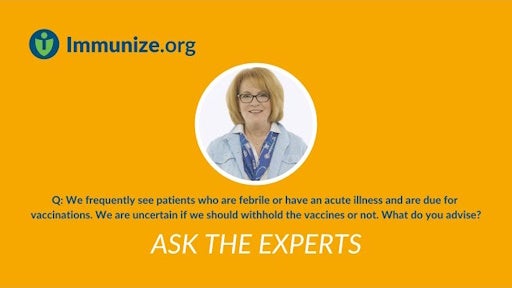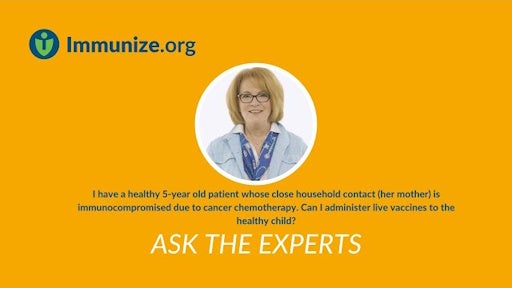An excellent resource for vaccine contraindications and precautions is the CDC online resource, “General Best Practice Guidelines for Immunization”. A table in the Contraindications and Precautions chapter has a listing for all routine vaccines in the United States available at www.cdc.gov/vaccines/hcp/imz-best-practices/contraindications-precautions.html. In addition, a table of contraindications and precautions is provided in the appendix of current CDC recommended adult and child/adolescent immunization schedules, available at www.cdc.gov/vaccines/hcp/imz-schedules.
Last reviewed:
February 19, 2024
A contraindication is a condition in a recipient that increases the risk for a serious adverse reaction to vaccination and is a condition under which vaccines should not be administered. In addition to contraindications found in prescribing information, ACIP may recommend against the use of a vaccine under certain conditions (e.g., a lack of data).
A precaution is a condition in a recipient that might increase the risk for a serious adverse reaction, might cause diagnostic confusion, or might compromise the ability of the vaccine to produce immunity. For example, not vaccinating a person who is moderately or severely acutely ill avoids diagnostic confusion between the underlying illness and side effects of vaccination. Vaccination may be deferred if a precaution is present, although a vaccination might be indicated in the presence of a precaution if the benefit of protection from the vaccine outweighs the risk for an adverse reaction.
Last reviewed:
August 29, 2022
Last reviewed:
March 28, 2023
No. Hospitalization should be used as an opportunity to provide recommended vaccinations. Hospitalized patients who are not moderately or severely acutely ill may be vaccinated during hospitalization or at discharge. Current, recent or upcoming anesthesia, surgery or hospitalization are not contraindications to vaccination, although certain factors may lead a healthcare provider to consider these situations a precaution to vaccination for a specific patient.
Last reviewed:
August 29, 2022
This is not true. Pregnant healthcare personnel may administer any vaccine except the live, replication-competent smallpox vaccine (ACAM2000, Emergent Biosolutions).
Last reviewed:
August 29, 2022
No. ACIP does not recommend routinely checking a patient’s temperature or other vital signs before vaccination. Requiring these extra steps can be a barrier to immunization.
Last reviewed:
August 29, 2022
A “moderate or severe acute illness” is a precaution for administering any vaccine. A mild acute illness (e.g., diarrhea or mild upper-respiratory tract infection) with or without fever is not a precaution, and vaccines may be given. The concern in vaccinating someone with moderate or severe illness is that a fever following the vaccine could complicate management of the concurrent illness – it could be difficult to determine if the fever was from the vaccine or due to the concurrent illness. In deciding whether to vaccinate a patient with moderate or severe illness, the clinician needs to determine if deferring vaccination will increase the patient’s risk of vaccine-preventable diseases, as is the case if the patient is unlikely to return for vaccination or to seek vaccination elsewhere.
Last reviewed:
August 29, 2022
Last reviewed:
March 28, 2023
Treatment with antibiotics is not a valid reason to defer vaccination. If the child or adult is otherwise well, or has only a minor illness, vaccines should be administered. But if the person has a moderate or severe acute illness (regardless of antibiotic use) vaccination may be deferred until the person’s condition has improved.
Last reviewed:
August 29, 2022
In general, neither exposure to or recovery from an infectious disease is a contraindication or precaution to vaccination. In particular, recovery from varicella (chickenpox) is not a reason to withhold a live vaccine, such as MMR.
COVID-19 is the exception to this general rule. CDC recommends that routine vaccination should be deferred for persons with suspected or confirmed COVID-19, regardless of symptoms, until criteria have been met for them to discontinue isolation. The reason for this exception is that vaccination visits for these individuals should be postponed to avoid exposing healthcare personnel and other patients to the virus that causes COVID-19.
Last reviewed:
August 29, 2022
No. Pregnancy tests prior to vaccination are not routinely recommended. However, patients of childbearing age should be asked about the possibility of their being pregnant prior to being given any vaccine for which pregnancy is a contraindication or precaution. The patient’s answer should be documented in the medical record. If the patient responds that they believe they may be pregnant, a test should be performed before administering vaccines not recommended or contraindicated in pregnancy.
Last reviewed:
August 29, 2022
The following vaccines are recommended for new mothers before they leave the hospital: (1) mothers without documentation of previous Tdap vaccination need a dose to protect themselves; (2) mothers who did not receive influenza vaccination during pregnancy need to be vaccinated if it is still influenza vaccination season (October through March); (3) mothers who tested susceptible to rubella on prenatal testing need MMR vaccine even if they have 1 or 2 documented doses of MMR in their medical record; (4) mothers who are not immune to chickenpox need 2 doses of varicella vaccine – the first dose before hospital discharge and the second dose 4 to 8 weeks after the first dose.
Last reviewed:
August 29, 2022
Due to theoretical risk to the developing fetus, ACIP recommends that pregnancy be avoided for four weeks after receiving a live attenuated vaccine (MMR, varicella, live attenuated influenza, yellow fever). This interval may be shorter than that recommended by the manufacturer.
Last reviewed:
August 29, 2022
Having a pregnant person in a household, including the child’s mother, is not a contraindication to administration of any routinely recommended vaccine. Pregnant people should not have close contact with anyone who has recently (within the last 28 days) received the live, replication-competent smallpox vaccine (ACAM2000, Emergent Biosolutions).
Last reviewed:
August 29, 2022
All vaccines except the live, replication-competent smallpox vaccine (ACAM2000, Emergent Biosolutions) and yellow fever vaccine may be given to people who are breastfeeding.
ACAM2000 is contraindicated due to the theoretical risk of contact transmission of the vaccine virus from mother to child.
The only yellow fever (YF) vaccine licensed in the United States (YF-Vax, Sanofi) is contraindicated in people who are breastfeeding infants younger than 9 months of age. There have been three case reports of YF vaccine-associated encephalitis in infants under one month of age who were being exclusively breastfed at the time the mother received YF vaccine. ACIP currently recommends that people who are breastfeeding should be advised to postpone travel to YF endemic or epidemic regions; however, if travel cannot be avoided or postponed, the breastfeeding parent should receive YF vaccine. Although there are no data, some experts recommend that breastfeeding people who receive YF vaccine should temporarily suspend breastfeeding, pump, and discard pumped milk for at least 2 weeks after vaccination before resuming breastfeeding.
Last reviewed:
August 29, 2022
A pregnant person may administer any vaccine except live, replication-competent smallpox vaccine (ACAM2000, Emergent Biosolutions).
Last reviewed:
August 29, 2022
It is estimated that for every million doses administered, about one (~0.0001%) will result in an anaphylactic reaction following vaccination. The estimate for mRNA COVID-19 vaccines is slightly higher, at 2 to 5 anaphylactic reactions per million vaccinations given. With proper screening, most providers who administer thousands of vaccines in their lifetimes will never see an anaphylactic reaction.
Last reviewed:
August 29, 2022
The antibiotics, of which there are trace amounts in some influenza vaccines, are neomycin, gentamicin, and polymyxin B. You should check each product’s package insert information to see which, if any, antibiotics are listed. Links to all current vaccine package inserts for vaccines are available at www.immunize.org/fda/.
Last reviewed:
October 4, 2022
Yellow fever is contraindicated for people who have a history of a severe (anaphylactic) allergy to eggs.
ACIP and CDC no longer consider egg allergy of any severity to be a contraindication or precaution to egg-based influenza vaccines. A person with egg allergy of any severity may receive any influenza vaccine that is appropriate for the person’s age and health status. When administering an egg-based influenza vaccine to a person with egg allergy of any severity, no additional safety precautions are needed, beyond those recommended when administering any vaccine to any recipient.
For more details about giving influenza vaccine to people with a history of egg allergy, go to www.cdc.gov/acip-recs/hcp/vaccine-specific/flu.html for a link to the current ACIP recommendations for influenza vaccination.
Last reviewed:
September 19, 2022
Allergy to egg is not a contraindication for MMR vaccine. Although measles and mumps vaccines are grown in chick embryo tissue culture, several studies have documented the safety of these vaccines in children with severe egg allergy.
Last reviewed:
August 29, 2022
Begin by asking a general question about whether the person has an allergy to any food, medication, or vaccine. If they report an allergy to gelatin or foods that contain gelatin, you could follow up by asking if they can eat Jell-O™ and gelatin-type products. Gelatin allergies are extremely rare. Only severe, life-threatening (anaphylactic) allergy is a contraindication to vaccination.
Last reviewed:
August 29, 2022
No. Vaccines available in the United States do not contain peanut products.
Last reviewed:
August 29, 2022
Yes. Allergy to bee venom is not a contraindication for any vaccine.
Last reviewed:
August 29, 2022
Latex is a product of the rubber tree. It is processed and used in various products, including some that come in contact with vaccines. Latex may be present in syringe plungers, vial stoppers, or in the tip caps on prefilled syringes. Some people develop sensitivity to latex, particularly if they have had significant cumulative latex exposure, such as from repeated surgeries early in life or employment in the healthcare industry.
The most common type of latex sensitivity is contact-type allergy; however, on rare occasions, severe (anaphylactic) allergy occurs. People with a history of anaphylactic reactions to latex should generally not be given vaccines that have been in contact with natural rubber or latex, either in the vial or in the syringe, unless the benefit of vaccination outweighs the risk of a potential allergic reaction. People with latex allergies that are not anaphylactic in nature may be vaccinated as usual.
Last reviewed:
August 29, 2022
Not all stoppers in vaccine vials contain latex. Some manufacturers have switched to synthetic rubber-like materials that do not contain rubber latex or dry natural rubber. The best approach is to check the package insert, which will indicate if the packaging contains latex. Also, remember that prefilled syringes could contain natural rubber in the plunger, in the needle cover, or in the tip cap. This information is also supplied in the package insert.
Last reviewed:
August 29, 2022
It is not recommended to remove the stopper from a vaccine vial before administering a vaccine to a person who has a severe life-threatening allergy to latex. The vaccine has already been exposed to the rubber stopper in the vial, which might be enough of an exposure to cause a reaction. These people should not be given the vaccine.
Last reviewed:
August 29, 2022
No. Children with Down syndrome should receive all indicated vaccines on the recommended schedule. These children are often at greater risk for complications from vaccine-preventable diseases than are children without Down syndrome.
Last reviewed:
August 29, 2022
Heroin use or addiction of the mother is not a reason to delay vaccination of an otherwise healthy infant.
Last reviewed:
December 28, 2022
Steroid treatment, and possible immunosuppression, is primarily a concern with live virus vaccines. Steroid therapy that is short term (less than 2 weeks); alternate-day; physiologic replacement; topical (skin or eyes); aerosol; or given by intra-articular, bursal, or tendon injection are not considered contraindications to the use of live virus vaccines. The immunosuppressive effects of corticosteroid treatment vary, but many clinicians consider a dose equivalent to either 2 mg/kg of body weight or a total of 20 mg per day of prednisone (or equivalent) for 2 or more weeks as sufficiently immunosuppressive to raise concern about the safety of vaccination with live virus vaccines (e.g., MMR, varicella, live attenuated influenza, yellow fever). Providers should wait at least 1 month after discontinuation of therapy or reduction of dose before administering a live virus vaccine to patients who have received high systemically absorbed doses of corticosteroids for 2 weeks or more. Inactivated vaccines and toxoids can be administered to all immunocompromised patients in usual doses and schedules, although the response to these vaccines may be suboptimal.
Last reviewed:
August 29, 2022
Last reviewed:
May 9, 2023
Vaccines received before starting chemotherapy generally do not need to be repeated after chemotherapy is completed. Chemotherapy does not negate vaccine-induced immunity. However, revaccination is recommended for people who are recipients of a hematopoietic cell transplant (HCT), such as a bone marrow transplant, because immunity present before the transplant is lost and may not be replaced by donor cells. For more information on this issue please refer to the Altered Immunocompetence section of the ACIP “General Best Practices Guidelines for Immunization” at www.cdc.gov/vaccines/hcp/imz-best-practices/timing-spacing-immunobiologics.html.
Last reviewed:
August 29, 2022
Yes. Household contacts and other close contacts of people who are immunocompromised (due to a disease, or treatment for a disease) should receive all routinely recommended vaccines, with the exception of smallpox vaccine. The live MMR, varicella, and rotavirus vaccines should be administered to susceptible household contacts and other close contacts of immunocompromised patients when indicated. MMR vaccine viruses are not transmitted to contacts, and transmission of vaccine strain varicella-zoster virus is rare. No specific precautions are needed unless the varicella vaccine recipient has a rash after vaccination, in which case direct contact with susceptible immunocompromised household contacts should be avoided until the rash resolves. All members of the household should wash their hands after changing the diaper of an infant who received rotavirus vaccine. This minimizes rotavirus transmission, as shedding may occur up to one month after the last dose.
Household and other close contacts of immunocompromised persons should receive annual influenza vaccination. Introduction of low levels of vaccine viruses into the environment likely is unavoidable when administering quadrivalent live attenuated influenza vaccine (LAIV4; Flumist, Medimmune). LAIV4 vaccine viruses are cold-adapted so they can replicate in the nose and generate an immune response without entering the lungs (that is, they are temperature sensitive and replicate poorly at core body temperatures). No instances have been reported of illness caused by attenuated vaccine virus infections among healthcare providers or immunocompromised patients. LAIV may be administered to healthy nonpregnant household and other close contacts of immunocompromised people unless the immunocompromised person is hospitalized in a protective environment, typically defined as a specialized patient-care area with a positive airflow relative to the corridor, high-efficiency particulate air filtration, and frequent air changes. A person who is administered LAIV4 should not have contact with an immunocompromised person in this type of protective environment for 7 days after administration.
Last reviewed:
August 29, 2022
Last reviewed:
May 23, 2023
Antibody titers to vaccine-preventable diseases decline during the 1-4 years after HCT, if the recipient is not revaccinated. HCT recipients are at increased risk for certain vaccine-preventable diseases, including those caused by encapsulated bacteria. In short, all HCT recipients should begin revaccination with inactivated vaccines 6 months after HCT. Three doses of pneumococcal conjugate vaccine (PCV) should be given 6 months following transplant followed by a dose of pneumococcal polysaccharide vaccine (PPSV) at least 8 weeks later. HCT recipients should receive 3 doses of Hib vaccine starting 6 to 12 months after successful transplant, regardless of vaccination history; doses should be administered at least 4 weeks apart. Immunocompetent people should receive MMR vaccine 24 months after transplant. For a complete discussion of the indications and schedule of vaccination, refer to the sub-section on recipients of HCT in the Altered Immunocompetence section of ACIP’s “General Best Practices Guidelines for Immunization” available at www.cdc.gov/vaccines/hcp/imz-best-practices/altered-immunocompetence.html.
Last reviewed:
August 29, 2022
Children with SCID may be given inactivated vaccines (e.g., DTaP, Hib, hepatitis B, pneumococcal conjugate, hepatitis A, IPV, and injectable influenza). They should not be given live virus vaccines (e.g., live attenuated influenza, MMR, rotavirus, and varicella).
Last reviewed:
August 29, 2022
Inactivated vaccines can be administered to people who take immunosuppressive drugs or who have a condition that causes them to be immunocompromised. The vaccines might not be as effective as they would be when given to a person with an intact immune system. If possible, the immunosuppressive drug should be discontinued for a month prior to vaccination, then allow the vaccine 2–3 weeks to generate an immune response before restarting the immunosuppressive treatment, but obviously, this is not always possible.
Determination of altered immunocompetence is important because incidence or severity of some vaccine-preventable diseases is greater in people with altered immunocompetence. As a result, certain vaccines (e.g., inactivated influenza vaccine and pneumococcal vaccines) are recommended specifically for people with altered immunocompetence.
More information can be found in ACIP’s “General Best Practices Guidelines for Immunization” available at www.cdc.gov/vaccines/hcp/imz-best-practices/altered-immunocompetence.html.
Last reviewed:
August 29, 2022
The IDSA guidelines indicate that persons receiving rituximab should be considered to have high-level immunosuppression. Both inactivated and live vaccines should be withheld at least 6 months following treatment with lymphocyte depleting medications such as rituximab. As for the IG, the interval to live vaccination depends on the dose. For guidance, please refer to the Timing and Spacing of Immunobiologics section of the ACIP’s “General Best Practices Guidelines for Immunization”, table 3-5: “Recommended intervals between administration of antibody-containing products and measles- or varicella-containing vaccine, by product and indication for vaccination” at www.cdc.gov/vaccines/hcp/imz-best-practices/timing-spacing-immunobiologics.html. This interval could be as long as 11 months, depending on the dose he receives.
Last reviewed:
August 29, 2022
Based on the weight and dosage provided (40 lbs and 15 mg/week), the child is currently receiving more than 0.4 mg/kg/week of methotrexate. This meets the Infectious Disease Society of America (IDSA) definition of high-level immunosuppression. Administration of both varicella and MMR vaccines are contraindicated until such time as the methotrexate dosage can be reduced. The 2013 IDSA definition of low-level immunosuppression for methotrexate is a dosage of less than 0.4 mg/kg/week. For additional details, see the 2013 IDSA Clinical Practice Guideline for Vaccination of the Immunocompromised Host: cid.oxfordjournals.org/content/early/2013/11/26/cid.cit684.full.pdf.
As a general rule, whenever feasible, it is recommended that non-live and live vaccines be administered 2 or more weeks before initiating immunosuppressive medications include human immune mediators like interleukins and colony-stimulating factors, immune modulators, and medicines like tumor necrosis factor-alpha inhibitors and anti-B cell agents. See CDC General Best Practice Guidelines for Immunization section on altered immunocompetence: www.cdc.gov/vaccines/hcp/imz-best-practices/altered-immunocompetence.html.
Last reviewed:
June 19, 2023
The probability of a serious allergic reaction following any vaccine is extremely low if the person is properly screened. ACIP has not issued a recommendation that desensitization injections and vaccines be separated by any specific time period; consequently, we feel that you should take the opportunity to vaccinate.
Last reviewed:
August 11, 2024



